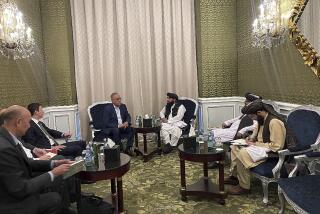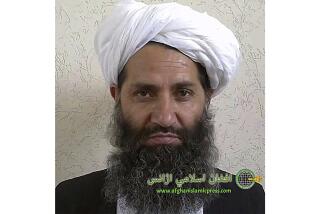U.S. cool to Karzai plan on Taliban
- Share via
Reporting from London — Afghan President Hamid Karzai told world leaders Thursday that he intends to reach out to the top echelons of the Taliban within a few weeks, accelerating a peace initiative that has troubled U.S. and many other Western leaders.
Karzai told officials of nearly 70 countries and of international aid groups at a gathering in London that he is seeking the mediation of Saudi Arabia and the blessing of Pakistan to try to negotiate peace with the leaders of the militant movement that was driven from power a little more than eight years ago.
The initiative is delicate for the Obama administration, which wants peace in Afghanistan but is sensitive to concerns about making peace with an opponent that has killed well over 1,000 Western troops and been blamed for aiding in the 9/11 attacks.
Secretary of State Hillary Rodham Clinton, in a presentation to the gathering, said the United States supports efforts for “reintegration” -- winning over foot soldiers through incentives. But she pointedly said nothing about “reconciliation” -- peace talks with the insurgent leadership.
Karzai has discussed the possibility of such a peace process before, including in the inaugural address he delivered in November as he took office for a second term. But this forum -- a conference of international officials who have supplied troops and aid to his country-- carried strong symbolic overtones.
Several Karzai associates have said privately that, in the wake of the summer’s scandal-tainted presidential election and amid deepening public anger over corruption, the Afghan leader is eager to leave a legacy. Being seen as the architect of a durable peace with the Taliban might be his last, best shot at strengthening his battered country’s security, government and economy.
The Afghan leader said he plans to convene a “grand peace jirga,” or council, of prominent Afghans in the next few weeks to debate what steps to take, thus lending legitimacy to the peace effort.
“We must reach out to all of our countrymen, especially our disenchanted brothers who are not part of Al Qaeda or other terrorist networks [and] who accept the Afghan Constitution,” Karzai said at the conference, whose delegates had gathered to discuss efforts to wind down the war.
Some officials attending the conference said Karzai’s idea has begun catching on with leaders of countries involved in the international coalition in Afghanistan, many of whom would like to find a way to reduce or end their involvement.
Even Clinton, during a news conference, registered no public objection to the idea of allowing Taliban leaders to take part in Karzai’s planned jirga, as his aides said they expect.
“You don’t make peace with your friends,” she told reporters.
“You have to be willing to engage with your enemies.”
U.S. officials insist that they are not pursuing peace with top militants. But some U.S. officials have privately indicated that they are open to deal-making, at least with insurgent leaders who meet several key conditions: renouncing violence, following the Afghan Constitution and, perhaps most important, agreeing to not help the Al Qaeda extremists whose presence in Afghanistan started the long war.
Karzai in his speech called for creation of a new peacemaking organization, to be called the National Council for Peace, Reconciliation and Reintegration. He said the jirga, a traditional Afghan public meeting, would be convened once the peace body was organized.
The Afghan leader said he hoped King Abdullah of Saudi Arabia would “play a prominent role to guide and assist the peace process.” And he said the Afghan government would ask all its neighbors, “particularly Pakistan,” to support the peace effort.
Karzai previously has sought help from the Saudis, who may be logical intermediaries in part because their government was one of only three to recognize the Taliban regime in the 1990s. Pakistan’s support for the idea could be crucial as well, partly because some elements of the Pakistani government have quietly supported and funded the Afghan Taliban for years.
Karzai is seeking other ways to reconcile with the Taliban. He commended the United Nations for taking several Taliban leaders off a list of individuals targeted for financial and travel sanctions because of their association with the group. He said he wanted “to see more progress in this regard.”
Still, many U.S. officials and Afghans are doubtful about the overtures. At the moment, many in the Taliban believe they are winning the war and have no reason to reconcile. And the militants widely despise the Karzai government.
A statement from the Taliban leadership, posted on a Taliban website on the eve of the British conference, appeared to throw cold water on the idea of negotiations, asserting that the movement would battle on until it expelled foreign forces from Afghanistan.
But some U.S. officials believe that if it begins to appear that the Taliban is losing ground, the view of its followers could change.
Brian Katulis, a national security specialist at the Center for American Progress, said an escalating international military effort, coupled with the peace effort, could provide “mutually reinforcing dynamics” that lead to a deal.
One obstacle to peace talks is the fear that acceptance of former Taliban fighters would lead to mistreatment of women.
A group of Afghan women appeared Thursday before the international conference, arguing against steps that risk a return to once-prevalent Taliban practices of harsh punishment, including violence against women judged to violate strict interpretations of religious law.
Kai Eide, the outgoing U.N. representative to Afghanistan, said the meeting marked the first time that a peacemaking effort was greeted with “such strong support” among Afghanistan’s international backers.
British officials and other sponsors of the meeting hoped it would pressure Karzai to accept more responsibility for Afghanistan’s security.
Karzai, who has faced international scorn because of the tainted presidential election, would like to build a legacy as a peacemaker, several of his associates have said.
The gathering received wide attention in Europe and the United States, but it drew little notice in Afghanistan.
Many Afghans were not aware that the London conference was taking place, but television screens flickered in a few downtown shops and restaurants in Kabul, the Afghan capital. Knots of customers gathered to watch Karzai’s speech, with some expressing skepticism that the gathering would have much effect.
“Even when the world is paying attention to us, it doesn’t help us much,” said a waiter named Faziullah, serving up steaming kebabs on a cold winter’s day. “These things are decided, and our lives stay the same.”
Times staff writer Laura King in Kabul contributed to this report.
More to Read
Sign up for Essential California
The most important California stories and recommendations in your inbox every morning.
You may occasionally receive promotional content from the Los Angeles Times.











